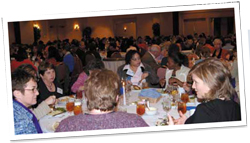 |
Leadership Training Conference
February 21-23, 2013 at the Sheraton Gateway Hotel, Atlanta GA. wicleadership.pcacep.org or call 1-800-283-1357. |
What is this conference and Who is it for?
Local Women’s Leadership Teams
by Editor
 |
Leadership Training Conference
February 21-23, 2013 at the Sheraton Gateway Hotel, Atlanta GA. wicleadership.pcacep.org or call 1-800-283-1357. |
What is this conference and Who is it for?
Local Women’s Leadership Teams
by admin
2013 Women in the Church Leadership Training Conference
Called to Serve – Equipped to Lead – Leading with Compassion
February 21-23, 2013
Sheraton Gateway Hotel, Atlanta, GA
A Conference for PresWIC Leadership, Local Women’s Leadership, Bible Study Leadership, Directors of Women’s Ministries, and PCA Staff Women
PURPOSE: To equip women for kingdom ministries
THROUGH: Transferable training, affinity groups, seminars, denominational connections, and networking of ideas and resources.
February marks the date for one of CEP’s most productive conferences…the annual Women’s Ministry Leadership Training Conference. We commend this event to:
Pastors: This conference provides an intentional opportunity to train up kingdom disciples who know, understand, and apply the Gospel. Value and encourage the gifts of women in your local church by investing in this training in loving and serving The Bride of Christ.
Women Ministry Leaders: Do you desire to grow in Christ? Do you desire to be further encouraged and equipped to better understand your ministry call? Do you desire to build communities of compassion among the women in your church? Then LT 2013 is being designed for you!
Visit wicleadership.pcacep.org for more information about the conference faculty and sessions.
Evaluate the emphasis on: teaching sound doctrine, providing transferable training tools and seminars, opportunities for relationship building, and regional denominational connectedness.
Read comments and benefits from recent attendees.
Pray about being part of an event whose emphasis is to equip women for, and involve them in ministries of compassion that bear kingdom fruit within the local church.
by Editor
On Tuesday afternoon, June 19, CEP will offer two back-to-back seminars designed especially for elders’ wives. The first seminar hour (2-3 pm) will combine a teaching segment and a season of prayer. The second seminar (3:30-4:30pm) will offer two separate panel discussions-one designed for Ruling Elders’ wives and one for the wives of Teaching Elders.
Elders’ Wives: What am I to do?
How do we think about our call to be an elder’s wife? Do questions like, “What am I to do?” or “Where is the training manual?” enter your mind? Just how do we biblically support our husband’s call as a shepherd in God’s Church? Join us for a discussion thatcombines purpose with practical equipping. A teaching segment that focuses on the Church, the household of God,will be followed by panel discussions highlighting the privilege of leadership marriages. Our prayer is that we will all leave encouraged and strengthened with answers to our questions.
Teaching Session: Kathy Stair, Ruling Elder’s Wife and Women’s Ministry Trainer
Panel Leaders: Karen Hodge, Teaching Elder’s’ Wife and Women’s Ministry Trainer and Cathy Wilson, Ruling Elder’s Wife and Women’s Advisory Sub-Committee Representative for Mid-America
If my husband had a dime for every time he heard me say, “You just don’t understand, nobody really knows just how I feel,” he would be a rich pastor. If you are anything like me, there are moments from time-to-time when you experience loneliness and isolation.I wantto invite you to join a conversation on Tuesday afternoon at General Assembly…one that is safe, authentic and one, prayerfully, where you will feel encouraged and enfolded. It is a conversation about the highest highs and the lowest lows of all that arepart of the calling of ministry marriage. I look forward to telling my husband “I was wrong…there are women who understand how I feel.”
 Karen Hodge is a motivating and encouraging pastor’s wife and mother of two beautiful children. She is having the time of her life serving alongside her husband Chris, Senior Pastor at Naperville Presbyterian Church. Prior to their newest adventure, Chris and Karen have served at Briarwood Presbyterian Church in Birmingham, AL, Christ Covenant Church in Charlotte, NC, and planted Treasure Coast Presbyterian Church in Stuart, FL. She also serves as National Trainer for the Women’s Ministries for the Presbyterian Church in America. She has a heart for MNA (Mission to North America) and sits in an advisory role to the Standing Committee of MNA as well as serving the Church Planting Assessment Center. It is from this perspective as wife, mother, leader, and friend that she offers insight from God’s word to women concerning how she and they can most effectively learn to enjoy and extend God’s glory.
Karen Hodge is a motivating and encouraging pastor’s wife and mother of two beautiful children. She is having the time of her life serving alongside her husband Chris, Senior Pastor at Naperville Presbyterian Church. Prior to their newest adventure, Chris and Karen have served at Briarwood Presbyterian Church in Birmingham, AL, Christ Covenant Church in Charlotte, NC, and planted Treasure Coast Presbyterian Church in Stuart, FL. She also serves as National Trainer for the Women’s Ministries for the Presbyterian Church in America. She has a heart for MNA (Mission to North America) and sits in an advisory role to the Standing Committee of MNA as well as serving the Church Planting Assessment Center. It is from this perspective as wife, mother, leader, and friend that she offers insight from God’s word to women concerning how she and they can most effectively learn to enjoy and extend God’s glory.
_____________________________________________________________________
Each year that I attend GA, I look forward to seeing friends from all of the places that we have lived and labored and sometimes it is a real “blast from the past” with wonderful surprises. But I also look forward to seeing the bigger picture that God is painting of His Church. Just as our local church “bodies” are built with individual gifts and graces, just like each of my friends, this PCA “body” is built of churches with individual gifts and graces that together help visualize God at work. This year I look forward to fellowshipping with ruling and teaching elders’ wives as we look at what Scripture shows us about how, we as wives of elders, are an integral part of this “body” building.
 Kathy Stair is the wife of Randy Stair, ruling elder and President of the PCA Foundation. They are parents of Julie and Brad, and grandparents of Samantha,Aidan, and Logan. Kathy and Randy are members of ChristChurch Presbyterian, Atlanta, GA. Kathy has served in several churchesin Women’s Ministry, five years as Administrative Assistant to CEP’s Coordinator of Women’s Ministries, and is a CEP Women in the Church Trainer.
Kathy Stair is the wife of Randy Stair, ruling elder and President of the PCA Foundation. They are parents of Julie and Brad, and grandparents of Samantha,Aidan, and Logan. Kathy and Randy are members of ChristChurch Presbyterian, Atlanta, GA. Kathy has served in several churchesin Women’s Ministry, five years as Administrative Assistant to CEP’s Coordinator of Women’s Ministries, and is a CEP Women in the Church Trainer.
______________________________________________________________________
In a culture attuned to individual callings and responsibilities and rights, are we taking time to evaluate our ministry as a couple to our local church? We will have a conversation with several ruling elders’ wives that will include, in part, these questions: What does the BCO have to say about our husband’s callings and what does that mean for us as wives? How do we come along side of them to enhance and support their service as elder to the glory of God and the edification of our churches? What might that look like in the context of our churches’ demographics and missions and our individual families’ giftings and other callings/responsibilities? My prayer is that we can be iron sharpening iron and contemplate together our privileges and responsibilities as wives of ruling elders, so thatwe can spur further discussion with our husbands and with our fellow church family elder’s wives.
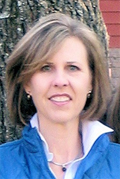 Leading the discussion is Cathy Wilson, wife of Bill Wilson, ruling elder at Christ Church, Normal, IL. Cathy serves as the Women’s Advisory Subcommittee representative for the Mid-America Region. During their marriage, they have been members of four PCA families in Memphis, St. Louis (where Bill also served on Session and Cathy was part-time coordinator of Women’s Ministries at Kirk of the Hills), Jackson, MS, and now Bloomington/Normal, IL. They have two college age children: Alexandra and Strother. Cathy works part-time at Talbots and serves on the Christ Church women’s ministry team, volunteers with Bill for Young Life, and helps him juggle his work, church and community involvements including his tennis matches! She runs for health, friendship and stress release!
Leading the discussion is Cathy Wilson, wife of Bill Wilson, ruling elder at Christ Church, Normal, IL. Cathy serves as the Women’s Advisory Subcommittee representative for the Mid-America Region. During their marriage, they have been members of four PCA families in Memphis, St. Louis (where Bill also served on Session and Cathy was part-time coordinator of Women’s Ministries at Kirk of the Hills), Jackson, MS, and now Bloomington/Normal, IL. They have two college age children: Alexandra and Strother. Cathy works part-time at Talbots and serves on the Christ Church women’s ministry team, volunteers with Bill for Young Life, and helps him juggle his work, church and community involvements including his tennis matches! She runs for health, friendship and stress release!
by Editor
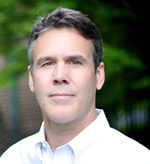 Timothy S. Lane, M.Div., D. Min. Tim is Executive Director and faculty member at CCEF and has been counseling for more than 25 years. He has previous experience in both campus and pastoral ministry, including serving as a PCA pastor for ten years in Clemson, SC. He is the author of several mini-books (Conflict, Practicing Forgiveness: Joining Wisdom and Love, Family Feuds, Freedom from Guilt, and Temptation). He is also the co-author of How People Change and Relationships: A Mess Worth Making. In addition, he is the co-author of CCEF’s Transformation Series Curriculum: How People Change; and the newly released Change and Your Relationships-A Mess Worth Making Study Guide.
Timothy S. Lane, M.Div., D. Min. Tim is Executive Director and faculty member at CCEF and has been counseling for more than 25 years. He has previous experience in both campus and pastoral ministry, including serving as a PCA pastor for ten years in Clemson, SC. He is the author of several mini-books (Conflict, Practicing Forgiveness: Joining Wisdom and Love, Family Feuds, Freedom from Guilt, and Temptation). He is also the co-author of How People Change and Relationships: A Mess Worth Making. In addition, he is the co-author of CCEF’s Transformation Series Curriculum: How People Change; and the newly released Change and Your Relationships-A Mess Worth Making Study Guide.
2012 CEP General Assembly Women’s Program:
The Gospel and Your Relationships
Every day our lives are filled with opportunities to experience the Gospel, and these often come through the relationships that fill our lives. How do we learn to walk with humility, gentleness, and love? What do we do when we experience conflict? How does God take the “ordinary” or even the painful moments of our relationships, and transform them into opportunities for growth and change? In this session we will explore these and other questions, and we will discover that Scripture speaks persuasively and practically about our relationships and the redemption that we can experience through them.
by Editor
2012 DVDS and bulletin inserts for the 2012 Women in the Churcn Love Gift will be available from the CEP Bookstore starting January 20. These are free of charge.
Gifts for the 2012 Women in the Church Love Gift may be mailed to: CEP, Attention: 2012 WIC Love Gift, 1700 North Brown Road, Suite 102, Lawrenceville, GA 300043 – 8122.
Gifts for the 2011 Women in the Church Love Gift for Covenant Theological Seminary are also still be accepted.
Thank you for your support of the ministries of the Presbyterian Church in America.

by Charles
I have had people ask why it is so important to think from a kingdom world and life view perspective. Why is it important to have a right kingdom paradigm? Jesus said, “Seek first my kingdom…” The kingdom is our priority, if we listen to, seek to please, and serve Him. Of course, that requires knowing something about the kingdom in both its diversity of activities and roles, as well as its unity of purpose. Keep in mind, we are not speaking of the kingdom of God or kingdom of Christ in geographic terms, but rather of the rule and reign of the Lord Jesus as King over His kingdom. Things will change with His final return.
First, I would say that having the right kingdom perspective keeps our focus on the sovereign Lord and King. Life is really about Him and his will in the ultimate sense. We are here at His pleasure, and if we are in His favor, it is by His grace and mercy.
Second, a right view of the kingdom helps remind us that as Christians our lives are whole, not fragmented or chaotic. It avoids the mistake of saying one part of life belongs to the Lord and another part belongs to us, as though there is a part of life and reality that does not belong to the Lord. Life cannot operate with such a dualistic nor even antithetical view between the spiritual and the natural. There is no sacred and secular dualistic approach to life from a biblically reformed position.
Read entire issue of Equip to Disciple, 4th Quarter 2011 (Acrobat Reader required).
Third, being kingdom focused in the wholistic sense, enables us to see that the special and general kingdom are actually one. As one kingdom, it includes the kingdom of darkness (with a little “k”), which should help us remember the church’s mission, as delineated by Jesus in places such as the Great Commission, is the spiritual mission of making kingdom disciples that requires discipling in a way that helps Christians know how to be in the world but not of the world. That is critical.
In Making Kingdom Disciples, A New Framework, we pointed out something we have learned, especially from Ecclesiastes. You can be a Christian and think like a Christian, or you can be a Christian and not think like a Christian, or you can be a Christian and sometimes think like a Christian and sometimes not. The church’s assignment is to enable those in Christ to be like Him, to think His thoughts, as both David and Paul have reminded us (Ps. 139:17, Rom. 12:1 & 2), and know how to be a witness for Christ to the world, as salt and light Christians, in a manner that does not compromise His truth.
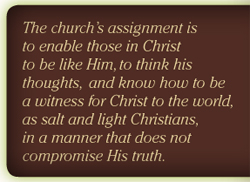 Kingdom discipleship focuses on the transformation of the mind, not simply in an abstract way, but in a manner that enables Christians to know what God would have them to do in life, as they move outside the special kingdom (the church) into the kingdom general to live with a Christian perspective (see illustration on page 8). The key is to have a kingdom focus that understands and knows what it means to acknowledge King Jesus as Lord of all. Of course, you do not have to be a Christian to live in the kingdom general because it encompasses all of life and reality, but to be a Christian living in the kingdom, you must have a Christian perspective and commitment as you live each day. No matter whether you are a school teacher, a technician, a historian, a scientist, an artist, a politician, etc., God requires that we bring His will and the mind of Christ into all those areas of life. If the church is following His instructions regarding the discipleship of all Christians, young and old, we will be better equipped to live in this world in a way that brings honor and glory to our God and does so in a way that demonstrates a Christian influence in all things. Paul said, “Whether we eat or drink or whatever we do, we are to do all to the glory of God” (I Corinthians 10:31).
Kingdom discipleship focuses on the transformation of the mind, not simply in an abstract way, but in a manner that enables Christians to know what God would have them to do in life, as they move outside the special kingdom (the church) into the kingdom general to live with a Christian perspective (see illustration on page 8). The key is to have a kingdom focus that understands and knows what it means to acknowledge King Jesus as Lord of all. Of course, you do not have to be a Christian to live in the kingdom general because it encompasses all of life and reality, but to be a Christian living in the kingdom, you must have a Christian perspective and commitment as you live each day. No matter whether you are a school teacher, a technician, a historian, a scientist, an artist, a politician, etc., God requires that we bring His will and the mind of Christ into all those areas of life. If the church is following His instructions regarding the discipleship of all Christians, young and old, we will be better equipped to live in this world in a way that brings honor and glory to our God and does so in a way that demonstrates a Christian influence in all things. Paul said, “Whether we eat or drink or whatever we do, we are to do all to the glory of God” (I Corinthians 10:31).
As Abraham Kuyper demonstrated in his Lectures on Calvinism, and as does Robert Munger in his popular allegorical booklet My Heart, Christ’s Home, all of life belongs to Him. There is not one square inch that does not belong to Christ, as Kuyper said.
At this point I want to plant this “seed” and continue to water it as we move forward. One of the main concerns preachers and teachers should have, whether formally or informally, teaching the Word to children, youth, and adults, is this: “Are my students or members getting the truth and understanding that being a Christian involves more than the basic and essential personal relation with Jesus? Do they understand that Christianity is a way of life, not only at church or even at home, but in the world as well?”
You may have read or at least heard at some point about a book by Reinhold Niebuhr entitled Christ and Culture. He presents differing thoughts and views on how Christians should relate to their cultural setting. In that book Neibuhr lays out three possible models as they relate to the Christian and culture. The first is called the separational model which refers to Christians withdrawing from the world. The second is the identificational model which refers to Christians living in the world and often identifying, even compromising, with culture. The third is the transformational model which suggests that Christians are responsible to try to transform culture, its structures, laws, etc., seeking to end up with a Christian culture. You recognize that third model in some of the more recent movements such as “reconstruction theonomy” or “the moral majority” or “the new religious right movement.”
All three models revolve around how to be a Christian, in Christ, and how to live in the world in a way that does not compromise the Christian faith nor keep Christians from failing to serve God’s purpose in their lives. As the late Robert Webber once wrote, the issue is, “How can I be a Christian in this dog-eat-dog world?”
We respond to those three paradigms like this (by the way, there is some truth in each of the three though they are ultimately flawed in light of God’s Word):
First, the separation model reminds us that we are not to be of the world, in the sense that our morals, values, lifestyles, and ideologies are not to be determined by the world’s philosophies. However, the Bible does teach that we are to go into the world, yet doing so in a way that enables us to have a holy influence, by not withdrawing our Christian witness.
 Second, the identification model opens the door to be both in the world and of the world which usually translates that the world has more influence on us than we have on the world. Again, we can and should use much in our culture as a means of serving God and bearing witness to Christ, but not to the point of comprising any part of God’s truth. We live in a fallen world and our culture is not free from the kingdom of darkness influence. Actually, we live in daily spiritual warfare. A further point to remember about this second model is that the more we are like something, especially what we are speaking against, the less influence we will have in that circumstance to make a difference.
Second, the identification model opens the door to be both in the world and of the world which usually translates that the world has more influence on us than we have on the world. Again, we can and should use much in our culture as a means of serving God and bearing witness to Christ, but not to the point of comprising any part of God’s truth. We live in a fallen world and our culture is not free from the kingdom of darkness influence. Actually, we live in daily spiritual warfare. A further point to remember about this second model is that the more we are like something, especially what we are speaking against, the less influence we will have in that circumstance to make a difference.
Third, the transformation model indicates that Christians have the responsibility to build a Christian society which is done not only by word and deed but by legislation as well.
As we understand the Kingdom of God or Kingdom of Christ paradigm, we realize that while the kingdom is very present with us, there is also along with that now aspect, the not yet eschatological fulfillment that will happen only with the return of Christ. At that time everything will be transformed into the new heavens and new earth, but not until then will we see complete transformation.
If the above remarks are true, then what is the church’s collective and the Christian’s individual roles in the kingdom? In one sense, as many have said, the church is presently the most visible form of the kingdom; however, we must remember that while the church is that special part of God’s kingdom (see the diagram from the first article in Equip to Disciple, particularly in their roles of making disciples), it must do so in a way that enables Christians to live in the world, unspotted from the world, as “salt and light” Christians. And, we must realize, and not expect, the church, to move beyond its assignment into the general kingdom. For example, while the church must “teach us to observe all things that Christ has commanded,” including how to think from a Christian perspective regarding government or the state, the church does not make political statements that take it outside the kingdom’s special realm and task. Would that the kingdom general were more like the church but not the church like the kingdom general, in all the aspects of life and reality, at least not until Christ returns. However, I think we could say that if the church is faithful in carrying out its disciple-making role, there certainly should be a noticeable Christ-likeness in all areas of life from Christians.
We need to realize that while this approach will not end in cultural transformation, and God does not require that of us, it will enable Christians to be in the world but not of the world and to have, by God’s common grace, a godly influence on those around them without communicating a “holier than thou” attitude. That attitude may in fact give us an opportunity to speak prophetically to that situation or circumstance.
For example, in a certain high school mathematics class there appears to be cheating on tests and homework. It seems as though almost everyone is doing it. The Christian young person understands that he must live the truth, do his work, and trust the Lord for the results, even when his friends make it easy for him to follow their pattern. You see, that test or homework assignments are not about the student, they are about God whom the Christian represents in that class and what He expects from His students.
Or take the business man compiling his yearly taxes. He knows from some of his associates how to end run the system and violate some of the tax laws, but because his primary mission in his business is to serve Christ and seek to honor Him, he will not allow himself to follow their example.
Or think of all the wife or husband swapping going on in today’s world. Everybody does it and who cares, so what’s the big deal? Christians must care because God has clearly spoken His mind and will regarding sexual behavior and marriage. We do not participate in those activities that violate God’s revealed will. Why? To make us acceptable to God? No, because God, having already chosen us in Christ, desires that our motive be to please Him by living a godly and holy life.
 Developing this world and life kingdom focus means that sermons and Bible studies must be presented in such a way that helps the people to be able to make that kind of world and life view connection. We must know that people in the pew and in our classes struggle to make that connection. They often need help in doing that. So, rather than saying or being tempted to think, “The only way I can survive in this life is to compromise the Christian faith in the marketplace,” we stand strongly and firmly in the Lord and say, “Because of Christ, I cannot compromise His truth even if I am the only one not participating.” That’s where the church’s role to equip Christians to think like a Christian and to live like one, no compromise, but rather to live in a way where all for Jesus comes into play.
Developing this world and life kingdom focus means that sermons and Bible studies must be presented in such a way that helps the people to be able to make that kind of world and life view connection. We must know that people in the pew and in our classes struggle to make that connection. They often need help in doing that. So, rather than saying or being tempted to think, “The only way I can survive in this life is to compromise the Christian faith in the marketplace,” we stand strongly and firmly in the Lord and say, “Because of Christ, I cannot compromise His truth even if I am the only one not participating.” That’s where the church’s role to equip Christians to think like a Christian and to live like one, no compromise, but rather to live in a way where all for Jesus comes into play.
While it is true that Christians live in or may come from different cultures, one being family, another church, another the marketplace, in public and in private, the kingdom disciple, equipped and trained by his church and his own personal studies and devotions, realizes that his life is all about King Jesus. Even as he is trapped in the tension and temptation to be like the world, he realizes giving in to temptation is not God’s will for his life. And remember, as the Apostle Paul said in Romans 12: 1, 2, as we think with a transformed mind, transformed by the Word and Spirit, we will know what God would have us to do.
That, my friends, is what kingdom education or discipleship is all about. Equipping Christians to live for Jesus in a way that serves His purpose through us to this generation. And the earlier we understand that in our Christian lives, the greater our desire will be to serve and please him and consequently experience His power within us. As He said to Pilate on the night of the trial, “I have come to bear witness to the truth.” Those words from Jesus, at that crucial moment in His life, have a message for us. From cradle to grave we are to be people of the truth. That’s what the church is all about-the truth. Paul calls the church the ground and pillar of truth. God’s truth in all of life, helps us through encouragement, instruction, and fellowship as we seek to live for him each day.
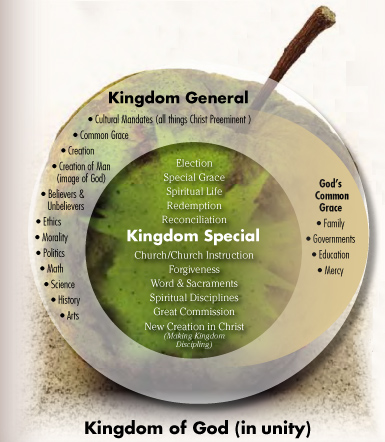
We must work and pray for the church to maintain its spiritual role of making kingdom disciples in order for those disciples to live as a Christian in today’s world. One depends on the other even as both the kingdom general and the kingdom special work to serve the same end or purpose which is “seeking to bring honor and glory to God in all things.”
(In part three we will attempt to describe and design the church’s role in discipling God’s covenant people.).
